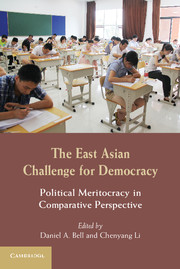Book contents
- Frontmatter
- Dedication
- Contents
- Contributing Authors
- Acknowledgments
- Introduction
- Section I The Theory of Political Meritocracy
- Section II The History of Political Meritocracy
- Section III Realizing Political Meritocracy Today
- 9 How East Asians View Meritocracy
- 10 Political Meritocracy in Singapore
- 11 Meritocracy and Political Liberalization in Singapore
- 12 China's Meritocratic Examinations and the Ideal of Virtuous Talents
- 13 Reflections on Political Meritocracy
- 14 Political Meritocracy and Direct Democracy
- Index
- References
14 - Political Meritocracy and Direct Democracy
A Hybrid Experiment in California
Published online by Cambridge University Press: 05 June 2014
- Frontmatter
- Dedication
- Contents
- Contributing Authors
- Acknowledgments
- Introduction
- Section I The Theory of Political Meritocracy
- Section II The History of Political Meritocracy
- Section III Realizing Political Meritocracy Today
- 9 How East Asians View Meritocracy
- 10 Political Meritocracy in Singapore
- 11 Meritocracy and Political Liberalization in Singapore
- 12 China's Meritocratic Examinations and the Ideal of Virtuous Talents
- 13 Reflections on Political Meritocracy
- 14 Political Meritocracy and Direct Democracy
- Index
- References
Summary
LOS ANGELES – At the turn of the 20th century when Western power was at its height, Sun Yat-Sen sought to blend the Confucian tradition of meritocratic governance and Western-style democracy in his vision for modern China. With the “rise of the rest” in the 21st century – led by China – perhaps the political imagination is open once again, this time not only to Western ideas flowing East but to Eastern ideas flowing West as well.
The political imagination has been pried open anew not only because of the sustained success of non-Western modernity in places such as Singapore and China but because democracy itself has become so dysfunctional across the West, from its ancient birthplace in Greece to its most advanced outpost in California. That liberal democracy is the best form of governance ever achieved in the long arc of history is no longer self-evident. Today, democracy must prove itself.
Even Francis Fukuyama, who declared “the end of history” with the triumph of market democracies after the Cold War, now seems to doubt his own verdict. In a conversation last spring with us and California Governor Jerry Brown, Fukuyama worried that American democracy, above all, had deteriorated into a “vetocracy” in which the general will and long-term sustainability are subverted by special-interest lobbies and the short-term mentality of ideologically rigid or narrowly self-interested constituencies. These organized groups have amassed the clout to veto whatever threatens their hold on government. The votes of ordinary citizens are thus steeply discounted, if not virtually meaningless.
- Type
- Chapter
- Information
- The East Asian Challenge for DemocracyPolitical Meritocracy in Comparative Perspective, pp. 375 - 394Publisher: Cambridge University PressPrint publication year: 2013

